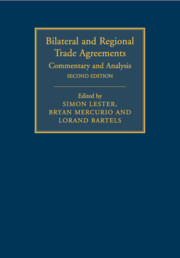Book contents
- Frontmatter
- Contents
- List of contributors
- Foreword
- Table of Cases
- Table of treaties and international agreements
- List of abbreviations
- Part I Introduction
- Part II Economics and politics of PTAs
- Part III Relationship with WTO and international law
- Part IV Legal aspects of PTAs: A comparative analysis
- 8 Agriculture
- 9 Regional trade agreements and trade in services
- 10 Investment
- 11 Government procurement
- 12 Intellectual property
- 13 Social issues: Labour, environment and human rights
- 14 Dispute settlement
- Index
9 - Regional trade agreements and trade in services
from Part IV - Legal aspects of PTAs: A comparative analysis
Published online by Cambridge University Press: 05 October 2015
- Frontmatter
- Contents
- List of contributors
- Foreword
- Table of Cases
- Table of treaties and international agreements
- List of abbreviations
- Part I Introduction
- Part II Economics and politics of PTAs
- Part III Relationship with WTO and international law
- Part IV Legal aspects of PTAs: A comparative analysis
- 8 Agriculture
- 9 Regional trade agreements and trade in services
- 10 Investment
- 11 Government procurement
- 12 Intellectual property
- 13 Social issues: Labour, environment and human rights
- 14 Dispute settlement
- Index
Summary
I. Introduction
The services sector accounts today for two-thirds of global output (63% of GDP in 2012; 45% of GDP in 1960) and represents the fastest growing sector of the global economy. In a world where competitiveness is key to economic development, services play a vital role in ensuring a competitive economy. Service industries provide the infrastructure allowing modern economies to function by linking geographically dispersed economic activities or supplying crucial inputs into products competing in the domestic and global markets.
However, the share of services in global trade has been relatively low as certain characteristics of services, such as intangibility and nonstorability, affect their tradability. Recent advances in information technology have nonetheless made trade in certain services now feasible or have greatly reduced its costs. Between 2000 and 2008, trade in commercial services (including in particular transport, travel, communications, financial, professional services) rose by 12% on average per year, with the share of global export from a few developing countries steadily increasing (China, India, Hong Kong and Singapore are among the top fifteen exporters of services). Following the financial crisis, the growth of global trade in commercial services has decreased (in 2013 it reached 6%). In 2013 (as in the past few years), commercial services have accounted for 19–20% of total world trade and global trade in commercial services has averaged 10–11% of GDP.
The growing internationalization of services also presents, in particular for developing countries, certain challenges. For example, these include the need to undertake necessary investments in modern IT networks, adapt educational systems to the information age, and design appropriate domestic and regional regulatory structures for service sectors.
In recent years the number of international agreements purporting to liberalize and promote trade in services has increased dramatically. While the General Agreement on Trade in Services (GATS), negotiated as part of the Uruguay Round in the late 1980s/early ’90s, has represented the pioneer – and often the model – in the field, much of the recent and current international treaty-making addressing trade in services (as well as trade in goods and foreign investment) has occurred at the regional and bilateral levels. The outlook stemming out of this almost frenetic treaty-making activity is a complex and multilayered network of international rules regulating the transnational movement of services and service providers in essential sectors such as the financial, telecommunication, business and professional sectors.
- Type
- Chapter
- Information
- Bilateral and Regional Trade AgreementsCommentary and Analysis, pp. 213 - 244Publisher: Cambridge University PressPrint publication year: 2016

